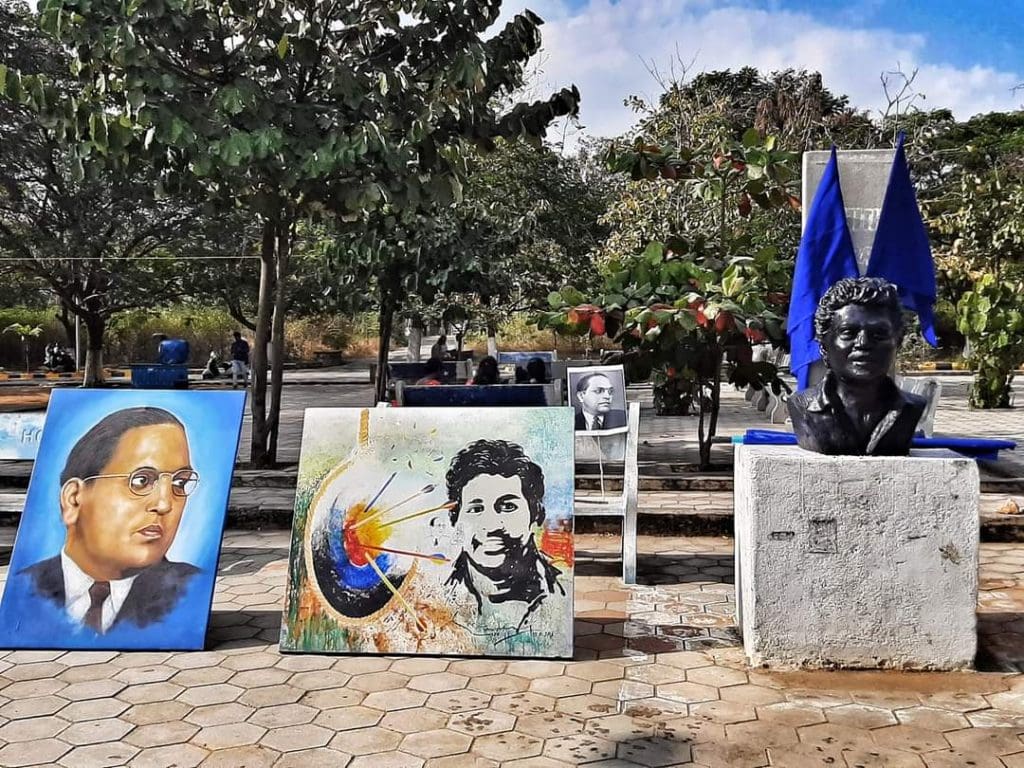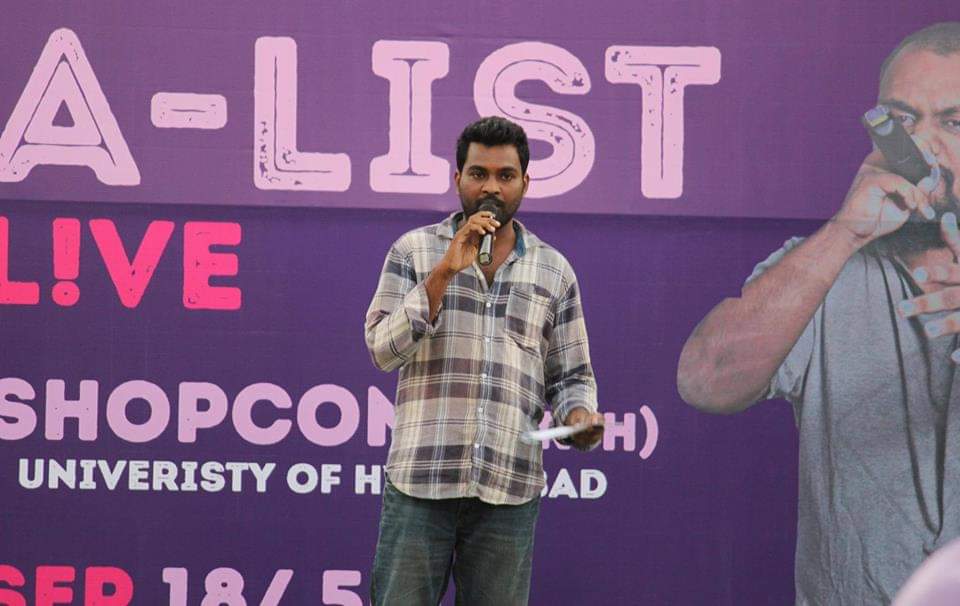
It was in 2019 January that the University of Hyderabad’s authority demolished ‘Velivada’ (Dalit Ghetto) that was built by Prashanth, Vijay, Sunkanna, and Sheshu, who were dismissed along with Rohit Vemula. Velivada was remaining as the fiery signifier of the dawning Dalit politics across the country. The Rohit’s sculpture, made in his memory, is the only reminiscence there now. Ambedkar was never accepted as a leader-figure in most of the Indian campuses until the self-sacrifice of Rohit Vemula. But Ambedkar was the only star-figure before and after Rohit in the University of Hyderabad.
I always think that, it was the solitude of Ambedkar, as scholars like Aishwary Kumar observes, that made him stand out. He was alone in the history of Indian freedom struggle. Ambedkar didn’t care about it much even when it was the seminal mainstream political struggle in the Colonial India. It was his constant worry about his community over the political brownie points that can be secured through the freedom struggle, that made him alone. Rohit embraced death through vivid reclamations of the same. Ambedkar was alone in his thought and politics. Rohit was alone in his life and death. None other than his soul could know that he was walking towards death.
We were participating in a strike along with the friends who announced it at the university shop com while Rohit was going to Uma Anna’s room, saying that he was going home but locked himself in. Initial gathering had started around seven. While everyone was at the shop com, Rohit closed the door into his solitude. It was almost one hour into the program, making a loud noise, someone started running towards the hostel premise from the bike parking area. We also joined him in anxiety. It was one of the most haunting sprints in my life. I wasn’t aware why we were running then. When I crossed the road, It was strongly felt that this sprint would only end up in front of some frightful news. However, we continued running. When we reached before the N.R.S hostel, we saw our friend Nagaraju sobbing in front of the hostel garden, face closed. We’d realized that we’re running towards something unbearable.
I cannot recollect the moments when we ran into the stairs of N.R.S hostel, without an intense heart. When we reached the first floor panting, a couple of students appeared standing, faces down. Climbing over the locked door, some people were trying to capture pictures of what is inside. It was an attempt to identify the person. I’d painfully realized that it was someone’s death, but didn’t know whose. Rohit’s name was shattering from the broken whispers of students who were walking back. My mind was struggling not to believe that it was Rohit Vemula, with whom I’d shared a tea last night while discussing setting up a film club following Heteroglassia international film festival, which had P Ranjith being one of the chief guests. I prayed to Allah by all my heart that this shouldn’t be Rohit. It was only when Tadagath, a teacher, who had been along with us while we were jailed after, cried aloud shouting the name of Rohit, my mind is hit with a sense of reality.


It was like some dead end. The unbearable desolation gave way to rippling rage. We’d decided not to give away the body to the police without having Appa Rao arrested. We waited till six o’clock morning, shouting slogans. Men and women held their hands together to form walls of resistance against the police. Dickens Leonard read Rohit’s final letter aloud, standing beside his body. The crowd weeps for each line. Louder slogans are raised to hide the intense pain. The image of Aanji, who couldn’t stand properly due to the pain and constant crying, is still in my mind breaking our hearts. Police were increasing the force outside in the meantime. More police vehicles arrived. They were slowly circling around us. Loudspeakers started to make threats and warnings. The long night had made most of the students weary when the sun was set to rise. The police were waiting to seize the opportunity. When the students scattered around as some of them going to hostels for a refreshing, a huge police crowd had entered the campus, quickly and forcefully. In a speck of a second, five of us standing in front were forcibly put inside to the police van. We had to stand helplessly in front of the Gachibowli police station, witnessing the ambulance, speeding along with our Rohit. It was almost noon when they released us.
When we returned to the campus, a media crowd including B.B.C and C.N.N were present in the university Shopcom. In the coming days, the campuses across the country flew to H.C.U, forming new, strong crowds around Rohit. At the corner of Shopcom, On the top of a building, A smiling sight of Rohit reflected the most twinkling stars of the large sky. Political leaders started marching to the campus in every dawn. People like Rahul Gandhi, Asadudhin Owaisi, Aravind Kejriwal etc delivered speeches. The entire campus boycotted the classes and spent their days at shopcom.
It was not the first time a Dalit student was sacrificing his life in an Indian university. But Rohit’s sacrifice had really started to sprout the caste roots of people. Rohit’s writings have been read in the universities and academic spaces across the globe, not as a literary text, but as a cue to rethinking about their own social roots. In other words, Rohit had put in a trial of the caste power and privilege of the Indian academicians across the world in the court of ethics. The caste difference has been accepted as the fundamental unit of politics, replacing an age of campus politics in which class difference determined the setting of student politics. The vernacular political tectonics that had already accepted caste as the major premise of their political mobilization and discourse started receiving national and international significance.
Rohit was alone even in the crowds created by himself. Rohit’s body was burned by the police before his friends seeing him and his mother and brother allowed to perform their last rites. The police intentionally misguided his friends who were setting off for the cremation procedures. But Rohit would outgrow the power of the police, raising into the realm of beyondness. Indian campuses are brought to fire in the rage for Rohit for several months. The ghetto, Or the Velivada, which was otherwise destined to be displaced/ otherized/ marginalized, recaptured the center. The geographical conceptions are shaken. Rohit did show us that the anti-caste politics is by default anti-state too. The old concepts, which had viewed caste as ‘social’ and colonialism as ‘political’, got sabotaged. The ensuing struggles did clearly show us that the state is the biggest agent of caste.
Rohit, who once described a group of Dalits from the Bhagana village of Haryana embracing Islam as the dawning of the spring, was seemingly clear and courageous towards the risk of Muslim politics. Maybe, that was what contributed to his solitude. As K.K Baburaj once noted, Muslim politics is extremely risky and precarious which has only losses to offer. Gandhi was the biggest example of that, and Rohit, the latest. History might protect those who move away, but those who encounter it will outlive. Today marks the fifth year of Rohit’s self-sacrifice. Following him, Najeeb, Anita, Una, Hathras… happened. And it’s flowing on. Rohit is continuing to be the confluence of all struggles.
The article is originally written in Malayalam and translated by Afeef Ahmed.
Muhammed Shah S is a PhD-Research Scholar at ASPECT, Virginia Tech, United States.



